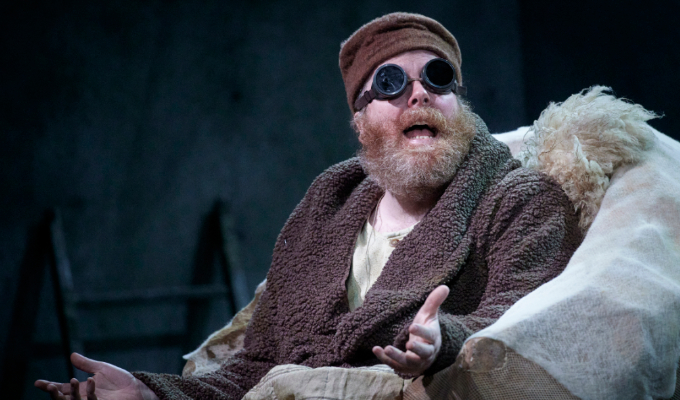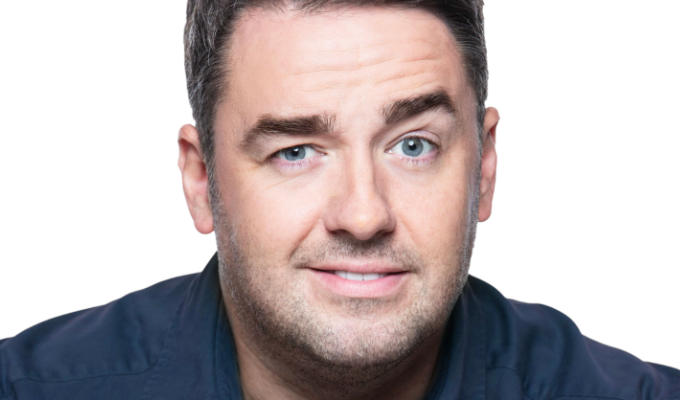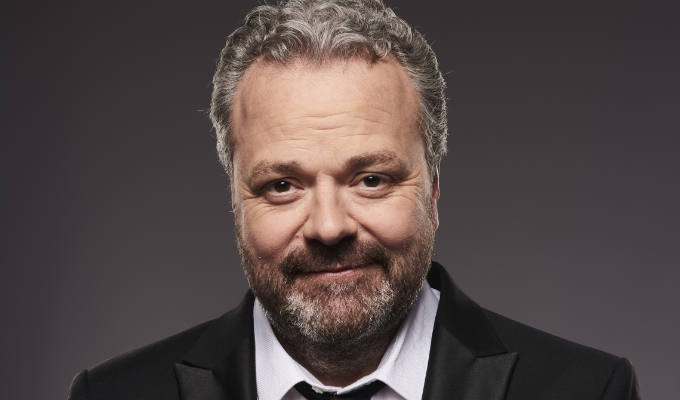 © Ros Kavanagh
© Ros Kavanagh Endgame, with Frankie Boyle
Review of a new production at the Gate Theatre, Dublin
Frankie Boyle might not seem the obvious name to be cast in a desolate Samuel Beckett play. But the nihilistic, uncompromising basis of his stand-up is not so far from the bleak existentialism at the heart of Endgame – that life is futile, brutal and absurd – which makes sense of his casting in this new production at Dublin’s Gate Theatre.
He plays Hamm, the blind, disabled character, reliant on his lifelong servant Clov for everything. His painkillers, his movement, his conversation. Yet the relationship is abusive, with the despotic Hamm imperiously summoning Clov with the blow of a whistle, then treating him with contempt.
They are confined to a featureless grey room and may well be the last people on a Earth, save for Hamm’s parents, Nagg and Nell, who occasionally pop their heads out of the dustbins where they have been condemned to spend their dying days. Clov is occasionally ordered to peer out of one of the two high windows to report on the post-apocalyptic desolation outside. The desolation inside is more palpable.
In his first stage acting role, Boyle makes a decent fist of Hamm, though he’s not the best thing in the play: an honour which goes to Robert Sheehan’s stiff, broken, and exhausted Clov. Every move is pain, but he still has some fight in his spirit, however impotent. Sheehan brings humour to both the tortured physically and the bitter exchanges, without lessening the misery.

Under the direction of Danya Taymor, Boyle loses himself in his character enough to leave any vestiges of his stand-up self behind. He’s excellent at the violent outbursts of anger required and brings a needy vulnerability to Hamm’s tyranny, exposing the insecurities of any bully. However, he doesn’t quite have the authority to mesmerise the audience with the longer, more subdued shaggy-dog story he tells. Even so, Beckett’s powerful and poignant closing soliloquy remains safe in Boyle’s hands.
Like Beckett’s previous play, Waiting For Godot, Endgame is a play in which very little actually happens, yet so much is beneath the surface. Contemplating their mortality and the pointlessness of their existence, Hamm and Plov talk obtusely, or in repetitive banalities. They are so utterly tired of life, but there’s still a spark of astringent humour to their pointed banter. This dynamic makes the play as witty as it is doleful. ‘Nothing is funnier than unhappiness, I grant you that,’ says Nell at one point, summing up Beckett’s entire philosophy.

She reminisces wistfully about better times as she fades into the night, while Nagg has a more sprightly absurdity to his comments. As with almost every aspect of this production, Gina Moxley and Sean McGinley straddle the line between the comic and the maudlin brilliantly, and every time their dustbin lids pop open on designer Sabine Dargent’s atmospherically pallid set it’s a bittersweet delight.
Review date: 17 Feb 2022
Reviewed by: Steve Bennett








